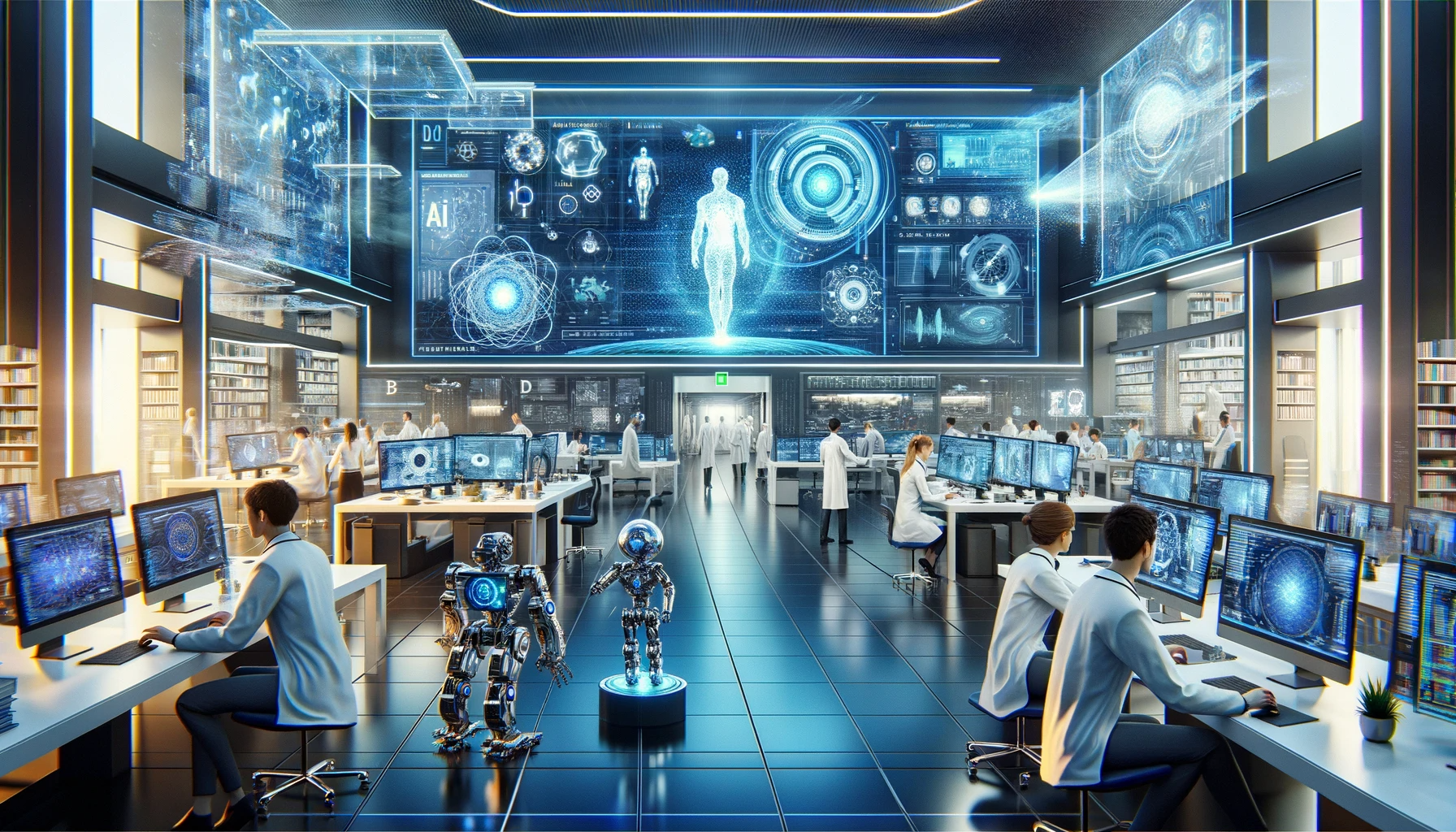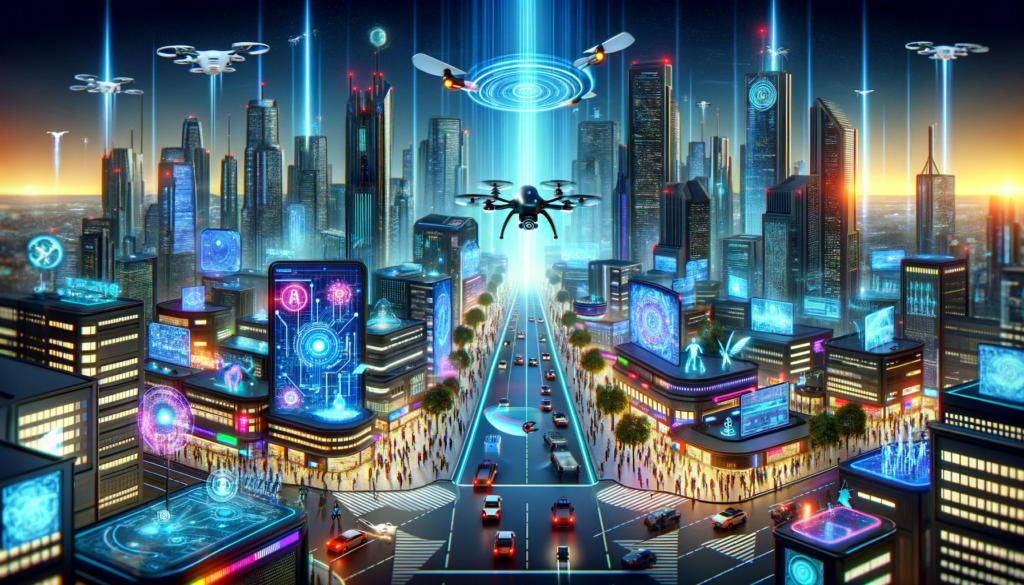The Future of AI
Artificial Intelligence (AI) has rapidly evolved from a futuristic concept to an integral part of our daily lives. Whether it’s the virtual assistant on your smartphone, the personalized recommendations on your streaming platform, or the self-driving capabilities of modern cars, AI is pervasive and increasingly sophisticated. This transformative technology has already reshaped industries, from healthcare to finance, and is poised to revolutionize many more.
The pace of advancement in AI is staggering. Machine learning algorithms, neural networks, and deep learning models have unlocked new possibilities, enabling AI to understand natural language, recognize complex patterns, and even beat humans at strategic games. These developments, while impressive, raise profound questions about the future.
At the heart of this technological evolution lies a central question: What does the future hold for AI, especially concerning the emergence of Artificial General Intelligence (AGI)? AGI represents a new frontier, where AI systems possess human-like cognitive abilities and can perform tasks across a wide range of domains. The pursuit of AGI raises possibilities and challenges that demand exploration.
In this article, we embark on a journey into the future of AI, contemplating the trajectory of this remarkable technology. We’ll delve into the current state of AI, its achievements, and its limitations. We’ll also peer into the horizon, speculating on the emergence of AGI and the profound impact it could have on society, industry, and our understanding of intelligence itself.
Join us as we navigate the exciting and sometimes uncertain terrain of AI’s future, where innovation and ethics intertwine, and the boundaries of possibility continue to expand.

The Evolution of AI
The journey of Artificial Intelligence (AI) from a theoretical concept to a transformative technology has been marked by significant milestones and continuous evolution. It all began in the mid-20th century when visionary computer scientists and mathematicians laid the foundations for AI. Early pioneers like Alan Turing and John McCarthy envisioned machines that could simulate human intelligence.
Over the decades, AI development witnessed crucial breakthroughs. In the 1950s, the creation of the first AI programs ignited hope. The 1960s brought symbolic AI, which used rules and logic for problem-solving. Expert systems in the 1970s paved the way for AI applications in specialized domains like medicine and finance.
However, AI’s progress was often hindered by limitations in computing power and the complexity of human intelligence. It was primarily focused on narrow or specialized tasks, which limited its scope.
The Current Landscape of AI
Today, AI has transcended its early limitations and is a ubiquitous presence in various sectors. From healthcare, where it assists in diagnostics and drug discovery, to finance, where it drives algorithmic trading, and transportation, where it powers self-driving cars, AI’s impact is profound.
One of AI’s remarkable features is its ability to automate repetitive tasks and analyze vast datasets quickly. In industries like e-commerce, AI-driven recommendation systems provide personalized experiences, boosting sales and user satisfaction. Moreover, AI’s capacity for data analysis has revolutionized fields like climate science and genomics, accelerating research and discovery.
Another pivotal role of AI is decision-making. In sectors like finance, AI algorithms make split-second trading decisions, while in healthcare, they aid clinicians in treatment planning and disease prediction.
The Quest for AGI (Artificial General Intelligence)
While current AI systems excel in specific tasks, they lack the broad-ranging intelligence and adaptability of humans. This brings us to the quest for Artificial General Intelligence (AGI), where machines possess human-like cognitive abilities and can apply them across a multitude of domains.
Achieving AGI is no small feat. It entails developing machines that can reason, learn, and generalize knowledge across diverse tasks, much like the human brain. Researchers and organizations around the world are actively pursuing AGI, recognizing its transformative potential.
Notable initiatives, such as OpenAI’s GPT-3, are pushing the boundaries of AI capabilities. GPT-3, with its astonishing language understanding, represents a significant step towards AGI. However, substantial challenges remain, including the need for machines to understand context, reason abstractly, and exhibit common sense.
As we explore the future of AI, AGI stands as a tantalizing horizon—a point where machine intelligence transcends narrow boundaries and enters the realm of general, adaptable cognition. The journey to AGI promises not only technological advancement but also profound philosophical and ethical questions that will shape the path forward.

The Potential Impact on Society
The emergence of Artificial General Intelligence (AGI) has the potential to reshape our society in profound ways. As AGI systems approach human-level intelligence, they could revolutionize industries, job markets, and economies.
In the industrial sector, AGI-powered automation may lead to increased efficiency and productivity. It could optimize manufacturing processes, predict maintenance needs, and reduce downtime. However, this may also raise concerns about job displacement, as routine tasks become automated. Preparing the workforce for the transition and upskilling will be crucial.
AGI’s impact on the job market is a topic of significant debate. While some fear job losses due to automation, others believe AGI will create new roles and opportunities. For instance, AI developers and ethical AI auditors will be in high demand. Moreover, AGI may augment human capabilities in various professions, from healthcare to law, enhancing decision-making and problem-solving.
Economically, AGI can lead to increased productivity and innovation, potentially boosting economic growth. However, its impact may not be evenly distributed, potentially exacerbating income inequality. Policymakers will need to address these disparities through thoughtful economic and social policies.
Ethical considerations surrounding AGI are paramount. Questions about control, ethics, and safety loom large. Ensuring that AGI systems are designed with robust safety measures and ethical guidelines will be crucial to prevent unintended consequences and misuse.
The Ethical and Regulatory Framework
As AGI development advances, it becomes increasingly important to establish an ethical and regulatory framework that guides its deployment. Ethical considerations must be at the forefront of AGI development, addressing issues related to bias, transparency, accountability, and safety.
The need for regulations and guidelines governing AGI is evident. These frameworks should encompass safety protocols to prevent AGI systems from causing harm intentionally or unintentionally. Additionally, ethical guidelines should ensure AGI respects human rights, privacy, and fairness.
Numerous initiatives and organizations are already working on ethical AI standards. Organizations like OpenAI have adopted principles of responsible AI development and deployment. They are committed to ensuring AGI benefits all of humanity and avoids enabling uses of AI or AGI that harm humanity or unduly concentrate power.
International collaboration will be crucial in establishing a unified global framework for AGI. Multilateral organizations, governments, and the AI community must work together to create standards that prioritize ethical AI and AGI practices.
Future Trends and Innovations
Looking beyond AGI, the future of AI holds numerous exciting possibilities. Emerging trends in AI technology include:
- Explainable AI: Addressing the “black box” problem in AI, where decisions made by algorithms are difficult to interpret. Explainable AI aims to provide transparency and understanding of AI decision-making processes.
- AI Ethics: As AI becomes more integrated into society, ethical considerations will continue to be a significant trend. Ethical AI principles and guidelines will evolve to ensure responsible and fair AI development and deployment.
- AI in Education: AI-powered personalized learning experiences, educational chatbots, and intelligent tutoring systems are poised to transform the education sector, providing tailored learning experiences for students.
- Quantum Computing and AI: The advent of quantum computing has the potential to significantly accelerate AI research and computation. Quantum AI algorithms could revolutionize machine learning and optimization problems.
- AI in Healthcare: AI applications in healthcare, including diagnosis, drug discovery, and patient care, will continue to expand. AI-powered medical imaging and predictive analytics hold promise for improving patient outcomes.
- AI and Sustainability: AI can play a vital role in addressing climate change and sustainability challenges. From optimizing energy consumption to monitoring environmental changes, AI-driven solutions will contribute to a more sustainable future.
The future of AI is bright and filled with innovation. While AGI is on the horizon, these emerging trends and innovations will continue to shape the AI landscape, impacting various sectors and improving the quality of our lives.
Challenges and Concerns
The future of AI and the prospect of AGI bring forth a host of challenges and concerns that cannot be ignored. It is imperative to address these issues responsibly as we navigate the path ahead.
One pressing concern is the issue of bias in AI algorithms. AI systems can inherit biases from their training data, leading to unfair and discriminatory outcomes. These biases can affect decisions in areas such as hiring, lending, and criminal justice, perpetuating existing inequalities. It is essential to prioritize bias mitigation techniques and ensure that AI systems are fair and unbiased.
Job displacement is another significant concern. As automation and AI technologies advance, some jobs may become obsolete, leading to potential unemployment. Preparing the workforce for these shifts through reskilling and upskilling programs is crucial to mitigate the impact on individuals and communities.
The potential misuse of advanced AI systems is a grave concern. AGI, with its human-level intelligence, could be used for malicious purposes, from deepfake generation to cyberattacks. Ensuring robust security measures, ethics, and regulations will be essential to prevent misuse.

Conclusion
In conclusion, the future of AI holds both immense promise and considerable challenges. As we stand on the brink of AGI, it is essential to proceed with caution, responsibility, and ethical considerations at the forefront.
AGI has the potential to revolutionize industries, enhance productivity, and improve our quality of life. However, its impact on employment, safety, and ethics must be carefully managed. Responsible AI development is not an option but a necessity.
To harness AI’s power for the greater good while mitigating risks, collaboration across sectors and international boundaries is essential. Policymakers, researchers, and industry leaders must work together to establish ethical frameworks, regulations, and guidelines that prioritize human well-being and safety.
As we move forward into an AI-driven future, we must remember that the true measure of success lies not only in technological advancement but in how we use AI to create a more equitable, inclusive, and responsible society. The choices we make today will shape the course of AI and AGI for generations to come.
